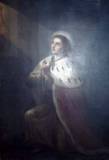PLEASE PRAY FOR THE FOLLOWING INTENTIONS
WHAT’S HAPPENING
| ||||||||||||||||||||||||||
|
St. Anselm Bishop,
Doctor April 21st
|
|
|
Come now, little man, turn aside for a
while from your daily employment, escape for a moment from the tumult of your
thoughts…Enter into the inner chamber of your soul, shut out everything except
God and that which can help you in seeking him, and when you have shut the door,
seek him. Anselm was born in Piedmont in Northern Italy. As a young man he was indifferent to religion. At age 27 he entered the famous Benedictine monastery at Bec in Normandy. Within three years he was prior, and fifteen years after that (at age 45 ) he was elected abbot. At age 60 he became Archbishop of Canterbury. Anselm was a teacher of minds and a father of souls As teacher, he influenced philosophy and theology. As a father of souls he is described as very traditional, very Benedictine, devoted to the Rule and to contemplation. Theology was for him “faith seeking understanding.” He wrote that “I believe that I may understand, and what is more I believe that unless I do believe, I shall not understand.” St. Anselm died after ministering as Archbishop of Canterbury for 16 years. He defended the freedom of the Church against interference by monarchs. He cared for the poor, and he was the first theologian to denounce the slave trade which he called the selling of men like cattle. He was declared a Doctor of the Church in 1720. Sources: IN HIS LIKENESS by Rev. Charles E. Yost, SCJ, STL |
|
|
|
THOUGHTS FROM THE CATECHISM OF THE CATHOLIC CHURCH |
The Risen One
#641 Mary Magdalene and the holy women who came to finish anointing the body of Jesus, which had been buried in haste because the Sabbath began on the evening of Good Friday, were the first to encounter the Risen One. Thus the women were the first messengers of Christ’s Resurrection for the apostles themselves. They were the next to whom Jesus appears: first Peter, then the Twelve. Peter had been called to strengthen the faith of his brothers, and so sees the Risen One before them; it is on the basis of his testimony that the community exclaims: “The Lord has risen indeed, and has appeared to Simon!”
#638 “We bring you the good news that what God promised to the fathers, this day he has fulfilled to us their children by raising Jesus.” The Resurrection of Jesus is the crowning truth of our faith in Christ, a faith believed and lived as the central truth by the first Christian community; handed on as fundamental by Tradition; established by the documents of the New Testament; and preached as an essential part of the Paschal mystery along with the cross…”
|
|
REFLECTION |
|

Ecology
Pope Francis is working on an encyclical which deals with ecology and which is predicted to be released sometime in 2015. Other recent popes have also expressed concern regarding environmental issues.
Pope John Paul II in his 1990 World Day of Peace message emphasized that the ecological crisis is, on many levels, a moral crisis. The moral implications are most apparent in “the lack of respect for life evident in many of the patterns of environmental pollution. Often, the interests of production prevail over concern for the dignity of workers, while economic interests take priority over the good of individuals and even entire peoples.”
Pope Benedict XVI referred to “human ecology” in his 2009 encyclical Caritas in Veritate.
“The Church has a responsibility towards creation and she must assert this responsibility in the public sphere. In so doing, she must defend not only earth, water and air as gifts of creation that belong to everyone. She must above all protect mankind from self-destruction. There is need for what might be called a human ecology, correctly understood. The deterioration of nature is in fact closely connected to the culture that shapes human coexistence: when “human ecology” is respected within society, environmental ecology also benefits. Just as human virtues are interrelated, such that the weakening of one places others at risk, so the ecological system is based on respect for a plan that affects both the health of society and its good relationship with nature.”
(From Pope Benedict’s encyclical Caritas in Veritate, # 51, 2nd paragraph)


 AT
ST. CASIMIR PARISH?
AT
ST. CASIMIR PARISH?
